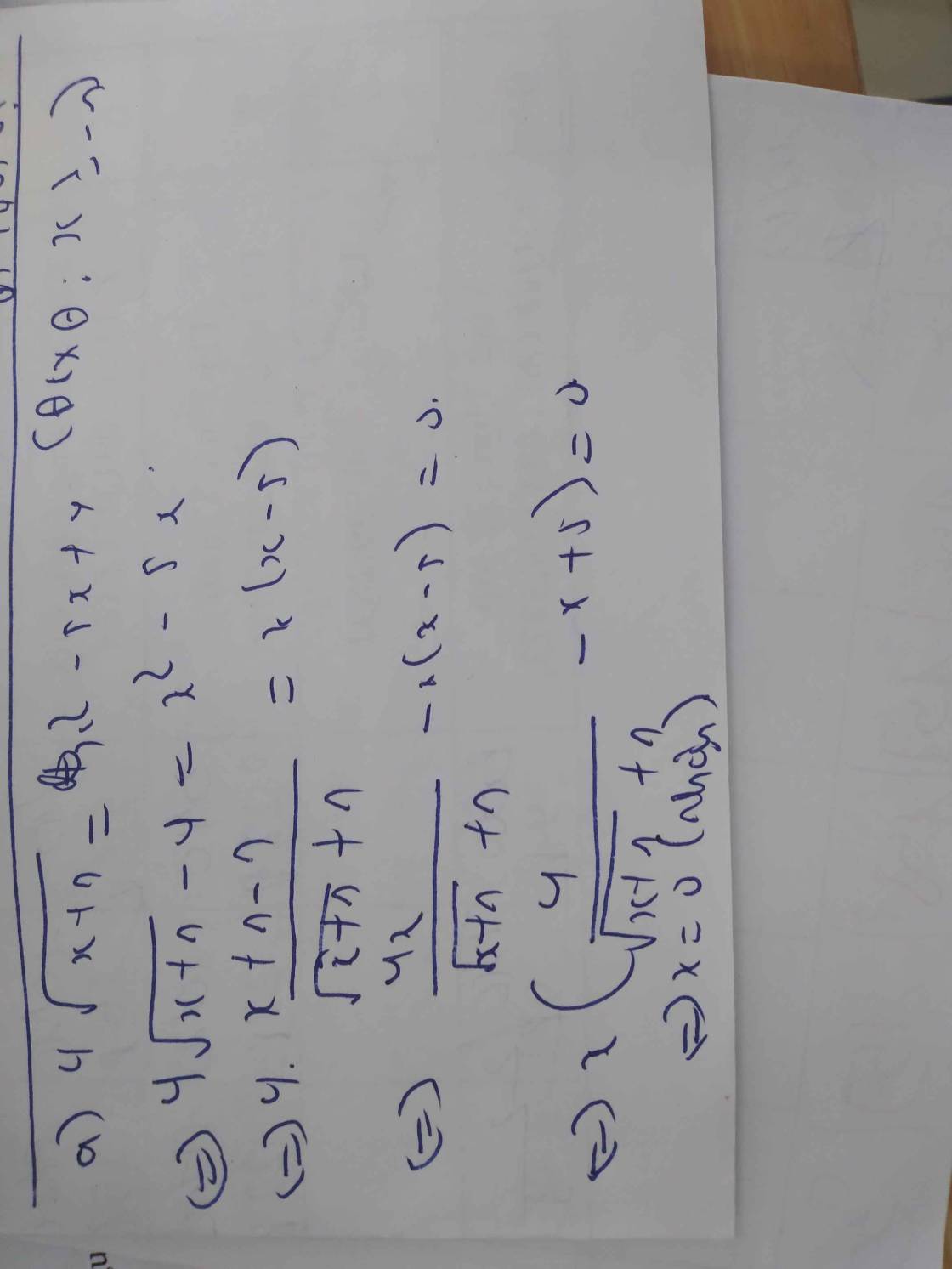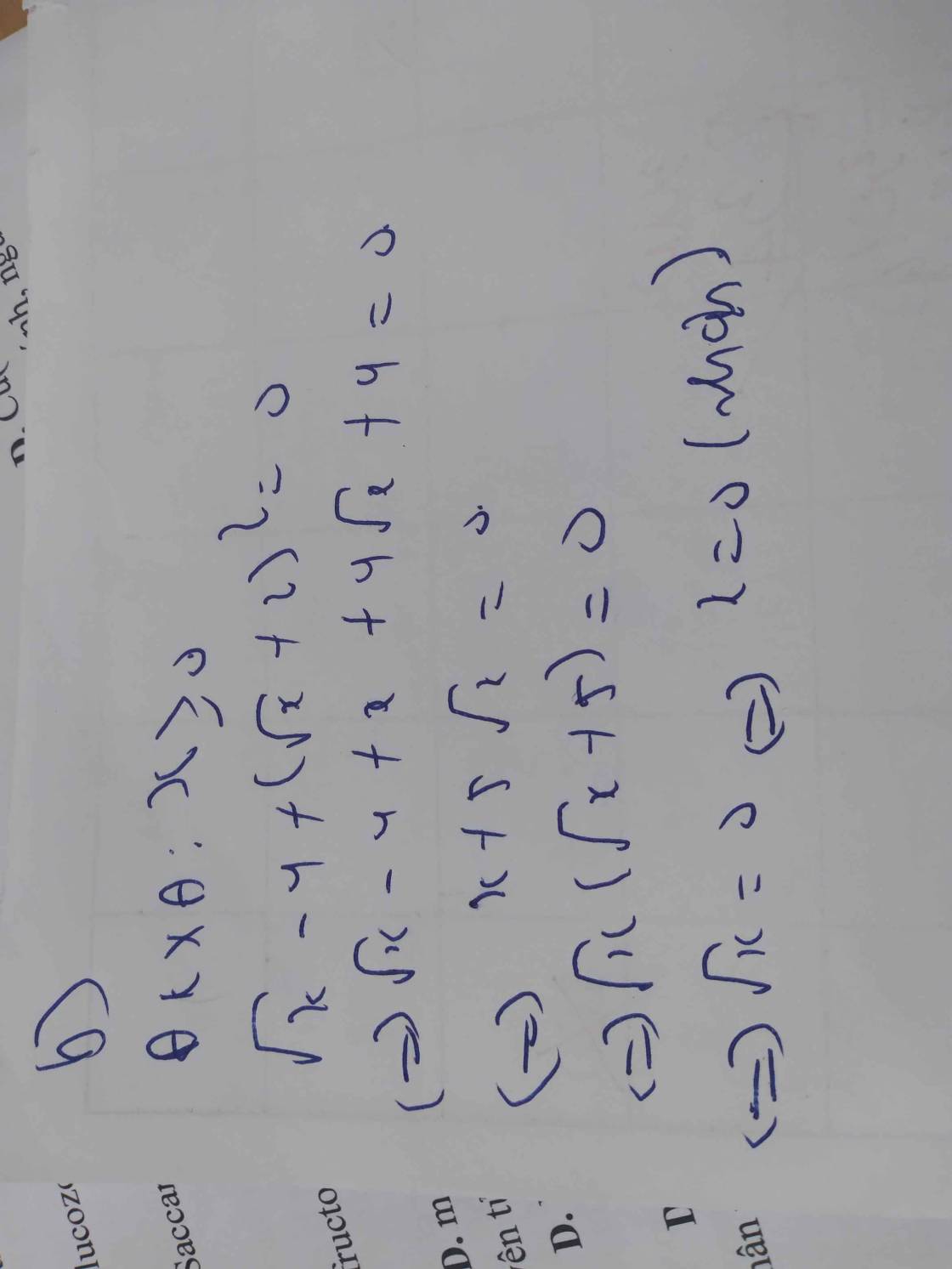
Hãy nhập câu hỏi của bạn vào đây, nếu là tài khoản VIP, bạn sẽ được ưu tiên trả lời.


a: =>\(x\cdot\left(\sqrt{3}-1\right)=16\)
=>\(x=\dfrac{16}{\sqrt{3}-1}=8\left(\sqrt{3}+1\right)\)
b: =>(x-căn 15)^2=0
=>x-căn 15=0
=>x=căn 15


2:
\(A=\dfrac{x_2-1+x_1-1}{x_1x_2-\left(x_1+x_2\right)+1}\)
\(=\dfrac{3-2}{-7-3+1}=\dfrac{1}{-9}=\dfrac{-1}{9}\)
B=(x1+x2)^2-2x1x2
=3^2-2*(-7)
=9+14=23
C=căn (x1+x2)^2-4x1x2
=căn 3^2-4*(-7)=căn 9+28=căn 27
D=(x1^2+x2^2)^2-2(x1x2)^2
=23^2-2*(-7)^2
=23^2-2*49=431
D=9x1x2+3(x1^2+x2^2)+x1x2
=10x1x2+3*23
=69+10*(-7)=-1

Lời giải:
Ta có: $\Delta=(m-3)^2+16>0$ với mọi $m$ nên pt luôn có 2 nghiệm phân biệt $x_1,x_2$ với mọi $m$.
Theo định lý Viet:
$x_1+x_2=m-3$
$x_1x_2=-4$
Có:
$\sqrt{x_1^2+2020}-x_1=\sqrt{x_2^2+2020}+x_2$
$\Leftrightarrow \sqrt{x_1^2+2020}-\sqrt{x_2^2+2020}=x_1+x_2$
$\Leftrightarrow \frac{x_1^2-x_2^2}{\sqrt{x_1^2+2020}+\sqrt{x_2^2+2020}}=x_1+x_2$
$\Leftrightarrow (x_1+x_2)\left[\frac{x_1-x_2}{\sqrt{x_1^2+2020}+\sqrt{x_2^2+2020}}-1\right]=0$
$\Leftrightarrow x_1+x_2=0$ hoặc $x_1-x_2=\sqrt{x_1^2+2020}+\sqrt{x_2^2+2020}$
Với $x_1+x_2=0$
$\Leftrightarrow m-3=0\Leftrightarrow m=3$ (tm)
Với $x_1-x_2=\sqrt{x_1^2+2020}+\sqrt{x_2^2+2020}$
$\Rightarrow (x_1-x_2)^2=(\sqrt{x_1^2+2020}+\sqrt{x_2^2+2020})^2$
$\Leftrightarrow -2x_1x_2=4040+2\sqrt{(x_1^2+2020)(x_2^2+2020)}$
$\Leftrightarrow 8=4040+2\sqrt{(x_1^2+2020)(x_2^2+2020)}$
$\Leftrightarrow \sqrt{(x_1^2+2020)(x_2^2+2020)}=-2016<0$ (vô lý - loại)
Vậy $m=3$

\(\left(2-\sqrt{5}\right)x^2+\left(6-\sqrt{5}\right)x-8+2\sqrt{5}=0\)
\(\Leftrightarrow\left(2-\sqrt{5}\right)x^2-\left(2-\sqrt{5}\right)x+\left(8-2\sqrt{5}\right)x-(8-2\sqrt{5})=0\)
\(\Leftrightarrow\left(2-\sqrt{5}\right)x\left(x-1\right)+\left(8-2\sqrt{5}\right)\left(x-1\right)=0\)
\(\Leftrightarrow\left(x-1\right)\left[\left(2-\sqrt{5}\right)x+\left(8-2\sqrt{5}\right)\right]=0\)
\(\Leftrightarrow\left[{}\begin{matrix}x-1=0\\\left(2-\sqrt{5}\right)x=-8+2\sqrt{5}\end{matrix}\right.\)
\(\Leftrightarrow\left[{}\begin{matrix}x=1\\x=\dfrac{-8+2\sqrt{5}}{2-\sqrt{5}}\end{matrix}\right.\)
\(\Leftrightarrow\left[{}\begin{matrix}x=1\\x=6+4\sqrt{5}\end{matrix}\right.\)
Vậy \(S=\left\{1;6+4\sqrt{5}\right\}\)

2: \(\text{Δ}=\left(m-4\right)^2-4\left(-m+3\right)\)
\(=m^2-8m+16+4m-12\)
\(=m^2-4m+4=\left(m-2\right)^2>=0\)
Do đó: Phương trình luôn có hai nghiệm với mọi m
Theo đề, ta có hệ phương trình:
\(\left\{{}\begin{matrix}3x_1-x_2=2\\x_1+x_2=-m+4\end{matrix}\right.\Leftrightarrow\left\{{}\begin{matrix}4x_1=6-m\\x_2=3x_1-2\end{matrix}\right.\)
\(\Leftrightarrow\left\{{}\begin{matrix}x_1=\dfrac{6-m}{4}\\x_2=\dfrac{3\left(6-m\right)}{4}-2=\dfrac{18-3m-8}{4}=\dfrac{10-3m}{4}\end{matrix}\right.\)
Theo đề, ta có: \(x_1x_2=-m+3\)
\(\Leftrightarrow\left(m-6\right)\left(3m-10\right)=16\left(-m+3\right)\)
\(\Leftrightarrow3m^2-30m-18m+60+16m-48=0\)
\(\Leftrightarrow3m^2-32m+12=0\)
\(\text{Δ}=\left(-32\right)^2-4\cdot3\cdot12=880>0\)
Do đó: Phương trình có hai nghiệm phân biệt là:
\(\left\{{}\begin{matrix}x_1=\dfrac{32-4\sqrt{55}}{6}=\dfrac{16-2\sqrt{55}}{3}\\x_2=\dfrac{16+2\sqrt{55}}{3}\end{matrix}\right.\)


đk: \(x\ge-2\)
Ta có: \(x^2+x-4+\left(x+6\right)\sqrt{x+2}=0\)
\(\Leftrightarrow x^2+x-4=-\left(x+6\right)\sqrt{x+2}\)
\(\Leftrightarrow\left(x^2+x-4\right)^2=\left(x+6\right)^2\left(x+2\right)\)
\(\Leftrightarrow x^4+2x^3-7x^2-8x+16=x^3+14x^2+60x+72\)
\(\Leftrightarrow x^4+x^3-21x^2-68x-56=0\)
\(\Leftrightarrow\left(x^4-4x^3-8x^2\right)+\left(5x^3-20x^2-40x\right)+\left(7x^2-28x-56\right)=0\)
\(\Leftrightarrow\left(x^2-4x-8\right)\left(x^2+5x+7\right)=0\)
PT \(x^2+5x+7=0\) vô nghiệm (tự chỉ ra)
\(\Rightarrow x^2-4x-8=0\Leftrightarrow\left(x-2\right)^2=\left(2\sqrt{3}\right)^2\Leftrightarrow\orbr{\begin{cases}x=2+2\sqrt{3}\\x=2-2\sqrt{3}\end{cases}}\)
Thử lại ta thấy \(x=2-2\sqrt{3}\) thỏa mãn
Vậy tập nghiệm của PT \(S=\left\{2-2\sqrt{3}\right\}\)